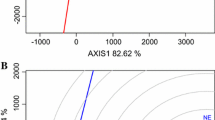Abstract
Wheat breeders frequently evaluate large numbers of germplasm and segregating populations for selection in field trials. For testing large number of germplasms under complete block design not much suitable because their assumption to accommodate all the treatment combination in each block that increase the size of experiment and reduce the accuracy. To avoid this constraint the present experiment was designed with objective to realise the suitability of alpha lattice design (ALD) over randomised complete block design (RCBD) in plant breeding experiments. The present experiment was conducted in ALD of 8 × 20 i.e. eight blocks each with 20 genotypes in two replications under rainfed and restricted irrigated conditions to estimate the drought tolerance indices. Nine drought tolerance indices were estimated using the data of rainfed and restricted irrigated conditions. These drought tolerance indices were subjected to analysis of variances of both the designs ALD and RCBD to know the efficiency of ALD over RCBD. The relative efficiency of trials shows that ALD was more efficient than RCB design. Based on grain yield per plant under both the conditions twenty-one tolerant genotypes and eleven susceptible genotypes were identified. Identified tolerant and susceptible genotypes can be used for development of mapping populations and for QTLs mapping programme for drought tolerance in wheat (Triticum aestivum L.).
Similar content being viewed by others
References
Abd El-Mohsen AA, Abo-Hegazy SR (2013) Comparing the relative efficiency of two experimental designs in wheat field trials. Sci Res Rev J 1(3):101–109
Cullis BR, Gleeson AC (1991) Spatial analysis of field experiments—an extension to two dimensions. Biometrics 47:1449–1460
Fard AK, Sedaghat S (2013) Evaluation of drought tolerance indices in bread wheat recombinant inbred lines. Eur J Exp Biol 3(2):201–204
Golabadi MA, Arzani SA, Maibody M (2006) Assessment of drought tolerance in segregating populations in durum wheat. AJAR 1(5):62–171
Idrees N, Khan MI (2009) Design improvement using uniformity trials experimental data. Pak J Agric Sci 46(4):315–320
Kempton RA, Seraphin JC, Sword AM (1994) Statistical analysis of two-dimensional variations in variety yield trials. J Agric Sci Camb 122:335–342
Manes Y, Gomez H, Puhl L, Reynolds M, Braun H, Trethowan R (2012) Genetic yield gains of the CIMMYT international semi-arid wheat yield trials from 1994 to 2010. Crop Sci 52:1543–1552
Masood AA, Yaqoob M, Khan MI, Saleem A (2006) Improving precisions of agricultural field experiments. J Sustain Dev 3(1, 2):11–13
Masood MA, Farooq K, Mujahid Y, Anwar MZ (2008) Improvement in precision of agricultural field experiments through design and analysis. Pak J Life Soc Sci 6:89–91
Patterson HD, Silvey V (1980) Statutory and recommended list trials of crop varieties in the United Kingdom. J R Stat Soc 143:219–252
Patterson HD, Williams ER (1976) A new class of resolvable incomplete block designs. Biometrika 63:83–92
Pilarczyk W (1991) Plant varieties and seeds. J Agric Sci Camb 128(5)
Trenberth KE (2011) Changes in precipitation with climate change research. Clim Res 47:123–138
Williams ER, Matheson AC, Harwood CE (2002) Experimental design and analysis for tree improvement, 2nd edn. CSIRO, Canberra
Yang R, Terrance ZY, Stanford SB, Manjula B (2004) Efficiency of spatial analyses of field pea variety trials. Crop Sci 44(1):49–55
Yau SK (1997) Efficiency of alpha-lattice designs in international variety yield trials of barley and wheat. J Agric Sci Camb 128(1):5–9
Acknowledgements
The authors express their thanks to Director, ICAR-Indian Institute of Wheat & Barley Research, Karnal and Director, Experimental Station, G. B. Pant University of Agriculture & Technology, Pantnagar for provide experimental material and facility to conduct the experiment.
Author information
Authors and Affiliations
Corresponding author
Additional information
Communicated by M. Molnár-Láng.
Rights and permissions
About this article
Cite this article
Kumar, A., Bharti, B., Kumar, J. et al. Improving the efficiency of wheat breeding experiments using alpha lattice design over randomised complete block design. CEREAL RESEARCH COMMUNICATIONS 48, 95–101 (2020). https://doi.org/10.1007/s42976-020-00014-3
Received:
Accepted:
Published:
Issue Date:
DOI: https://doi.org/10.1007/s42976-020-00014-3




